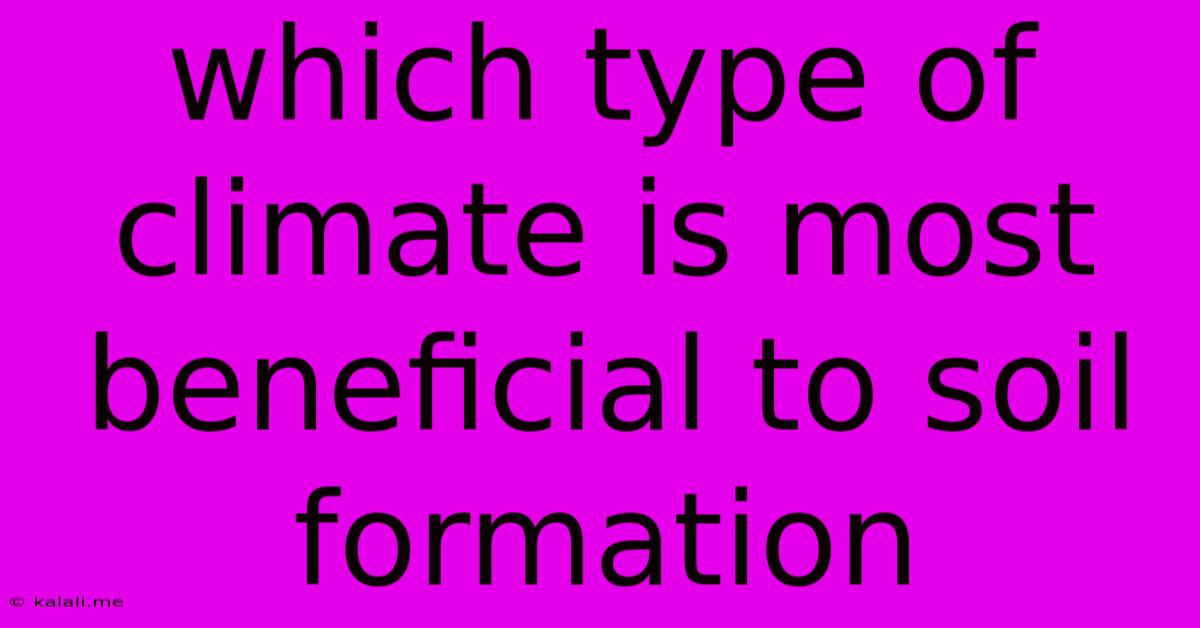Which Type Of Climate Is Most Beneficial To Soil Formation
Kalali
May 10, 2025 · 3 min read

Table of Contents
Which Climate Type is Most Beneficial to Soil Formation?
Meta Description: Discover which climate type fosters the most robust soil formation. We delve into the factors influencing soil development, comparing humid, arid, and temperate climates to determine the ideal conditions. Learn about the crucial roles of temperature, precipitation, and vegetation in soil creation.
Soil formation, or pedogenesis, is a complex process influenced by numerous factors, but climate emerges as a dominant player. While all climates contribute to soil development, certain conditions are far more conducive to creating deep, fertile, and diverse soils. This article explores the relationship between climate type and soil formation, highlighting why certain climates are more beneficial than others.
The Key Players: Temperature, Precipitation, and Vegetation
Before diving into specific climate types, let's understand the critical climatic elements influencing soil formation:
-
Temperature: Warmer temperatures accelerate chemical and biological weathering processes, breaking down parent material faster. This leads to increased nutrient release and the formation of clay minerals. However, excessively high temperatures can also hinder soil development through rapid evaporation and the destruction of soil organic matter.
-
Precipitation: Rainfall is essential for chemical weathering and nutrient leaching. It also influences the rate of soil erosion. Moderate rainfall is generally ideal; excessive rainfall can lead to nutrient depletion through leaching, while insufficient rainfall can limit weathering and biological activity.
-
Vegetation: Plants play a vital role in soil formation by contributing organic matter, improving soil structure, and preventing erosion. The type and density of vegetation depend heavily on the climate. Lush vegetation in humid climates contributes significantly to soil organic matter, while sparse vegetation in arid climates results in slower soil formation.
Comparing Climate Types and Their Impact on Soil Formation
Several climate types significantly impact soil formation. Let's compare three major types:
1. Humid Tropical Climates: These climates, characterized by high temperatures and abundant rainfall, are typically associated with the most rapid soil formation. The intense weathering processes lead to the development of thick, deeply weathered soils, often rich in clay minerals. However, heavy rainfall also causes significant nutrient leaching, potentially resulting in less fertile soils despite their depth. Lateritic soils are a common example, characterized by high iron and aluminum oxide content.
2. Arid and Semi-Arid Climates: Low precipitation in these climates significantly limits the rate of soil formation. Chemical weathering is slow, and the lack of vegetation leads to increased erosion and less organic matter accumulation. Soils in arid climates are often shallow and poorly developed, with a high accumulation of salts due to limited leaching. Desert pavements and caliche formations are common features of these soil landscapes.
3. Temperate Climates: Temperate regions with moderate rainfall and temperatures generally experience a balance between weathering and erosion, resulting in the development of relatively fertile soils. The presence of distinct seasons leads to variations in biological activity, impacting soil organic matter content and structure. Mollisols, characterized by high organic matter content and excellent fertility, are a prominent example of soils developed under temperate grasslands.
Conclusion: The Ideal Climate for Soil Formation
While humid tropical climates exhibit the fastest rates of soil formation, the optimal climate for developing deep, fertile, and stable soils is arguably a temperate climate with moderate rainfall and temperatures. This balance allows for efficient weathering, nutrient cycling, and organic matter accumulation, creating soils suitable for agriculture and supporting diverse ecosystems. The best soil types are often a result of a synergistic interplay between climate, parent material, topography, and time. Understanding these interacting factors is key to comprehending the remarkable diversity and complexity of the Earth’s soils.
Latest Posts
Latest Posts
-
What Is Fgteev Duddys Real Phone Number
Jul 04, 2025
-
What Are 2004 Pennies Worth Worlds Easyest Game
Jul 04, 2025
-
Who Did Alan Jackson Have An Affair With
Jul 04, 2025
-
How Much Is 500 Grams Of Ground Beef
Jul 04, 2025
-
1 Pound Pasta Is How Many Cups
Jul 04, 2025
Related Post
Thank you for visiting our website which covers about Which Type Of Climate Is Most Beneficial To Soil Formation . We hope the information provided has been useful to you. Feel free to contact us if you have any questions or need further assistance. See you next time and don't miss to bookmark.